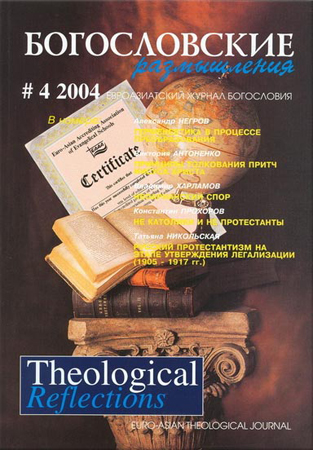Russian Protestantism at the Stage of Legalization: 1905-1917
Keywords:
Russian Protestants, legalization of Russian Protestantism, religious politicsAbstract
This article examines the legal and civil status of Russian Protestants at the beginning of the twentieth century. By that time there were at least three streams that later developed into the confessions of Russian Protestantism — Evangelical Christians, Baptists, and Seventh Day Adventists; Pentecostals emerged soon after. The Edict “On Strengthening the Beginnings of Religious Tolerance” dated April 17, 1905, defined the legal rights of Russian religious minorities and abolished their persecution as apostates. Nevertheless, the contradictory nature of the Russian laws allowed local authorities to take arbitrary action against Russian Protestants. Within religious politics and the social movements of that time two opposing currents fought with varying success: sympathy for the emancipation of Russian Protestants and attempts to stop this process by legislative, criminal, administrative, and social means. The latter tendency prevailed during World War I; however, the February Revolution of 1917 declared all confessions equal. Although before 1917 Russian Protestants were a persecuted religious minority, their participation in the revolutionary movement was sporadic, and their social activities were directed largely to advocacy for the establishment of freedom of conscience and civil institutions in Russia, as well as to defense of the rights of fellow believers. Unlike Protestants in the West, Russian Protestants could not and did not strive to become at all an influential movement, claiming a special social political role in the history of the country. However, the legalization of Russian Protestantism was very important. Later on, despite hardships and periods of severe persecution, Russian Protestantism preserved its legal status (at least partly, on the level of individual communities or confessions) and proved to be an independent and tenacious phenomenon of Russian religious life.
References
- Archival Sources
- The Archives of St. Petersburg Evangelical ChristianBaptist church (ACEB). F.4 (Samizdat). In.1. File 27a; In.4. File 20.
- The Collection of Statutes and Orders of the Government, published by the Governing Senate (CS). Section 1. 1905, 1917.
- The Complete Collection of the Laws of the Russian Empire. 3rd Ed. (3CCL). 1903-1906. V.XXIII, XXIV, XXV, XXVI.
- CPSU in Resolutions and Decrees of Congresses, Conferences, and Plenums of the Central Committee. V.1. Moscow, 1983.
- F.796 (the Holy Synod). In.442, file 1581, 2105, 2152, 2165, 2290, 2348, 2645, 2741, 2757, 2760, 2768, 2769, 2783, 2791, 2836; In.445. File 709.
- F.821 (the Department of the Religious Affairs of Foreign Confessions). In.150. D.961.
- The Russian State Historical Archives (RSHA, St. Petersburg) F.776 (Central Administrative Board on Press of the Ministry of Internal Affairs). In.8, File 2116; In.9. File 1679.
- St. Petersburg Central State Archives (CSA). F.1001 (Petrograd Provincial Administrative Department). In.7. File 47.
- Periodicals
- Rech’ (Speech). A daily political and literary newspaper. St. Petersburg, 1910.
- Russkoe znamia (The Russian banner). An organ of the Union of the Russian People. St. Petersburg, 1910.
- Russkie vedomosti (The Russian gazette). A daily newspaper. Moscow, 1910.
- Birzhevie vedomosti (The stock exchange bulletin). A newspaper of stock exchange, finances, trade, politics, and social life. St. Petersburg, 1910.
- Slovo istiny (The word of truth). A magazine of the Russian Baptists. Petrograd, 1917.
- Zemshchina (The populace). A newspaper. St. Petersburg, 1910.
- Other Sources
- Biddulph, H. L. The Morning Breaks. Salt Lake City: Deseret Book Company, 1996.
- Dorskaia, A. A. “Vopros o svobode sovesti v Rossiyskom zakonotvorchestve (The problem of freedom of conscience in Russian lawmaking, 19051917).
- Candidate of Science diss.: 07.00.02, St. Petersburg History Institute of the Russian Academy of Sciences, 1997.
- Istoriia evangel’skikh khristianbaptistov v SSSR (The history of the Evangelical ChristianBaptists in the USSR). Moscow,
- Iz istorii tserkvi adventistov sed’mogo dnia v Rossii (From the history of the Seventh Day Adventists in Russia). Kaliningrad,
- Korabel’, A. I. “Koloski polinikha” (Ears of wormwood). Lad’ia № 8,9 (2002).
- Logvinenko, V.E. “Stoletie pervogo ob’edinennogo s’ezda predstaviteley evangel’skikh techeniy v Sankt-Peterburge” (The 100th anniversary of the first joint congress of evangelicals in St. Petersburg). Bratskiy vestnik, № 4, (1984): 5157.
- Popov, V. A. Stopy blagovestnika (The feet of him who brings good tidings). St. Petersburg: Bibliia dlia vsekh, 1996.
- Prokhanov, I. S. In the Caldron of Russia. USA: WUEC, 1992.
- Sanborn, D. “Besporiadki sredi prizyvnikov v 1914 I vopros o russkoy natsii: Novy vzgliad na problemu” (Disturbances Among Draftees in 1914 and the question of the Russian Nation: A new perspective). In Rossiia i Pervaia mirovaia voyna (Russia and World War I). St. Petersburg: 1999: 202215.
- Savinskiy, S. N. Istoriia russko-ukrainskogo baptizma (The history of RussianUkrainian Baptism). Odessa: Bogomislie, 1995.
Downloads
How to Cite
Issue
Section
License
Copyright (c) 2020 Tatiana NIKOLSKAYA

This work is licensed under a Creative Commons Attribution-NonCommercial 4.0 International License.
All articles published in the Journal are distributed under a Creative Commons Attribution-NonCommercial 4.0 International License
By submitting an article for publication in Theological Reflections: Eastern European Journal of Theology the author grants the editors the right to publish the article and distribute it in electronic and print form.
The author reserves all copyrights and the right to use the materials of the article in whole or in part for educational purposes, to write his own dissertations, to prepare abstracts, conference reports, oral presentations, etc., as well as post electronic copies of articles (including the final electronic version downloaded from the journal’s official website) on non-commercial web-resources without the consent of the editorial board and founders.



